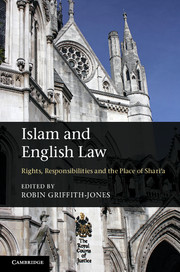Book contents
- Frontmatter
- Contents
- List of contributors
- List of abbreviations
- Preface
- Introduction
- Part I The Archbishop of Canterbury and shariʽa law
- 1 The ‘unavoidable’ adoption of shariʽa law – the generation of a media storm
- 2 Civil and religious law in England: a religious perspective
- Part II The Archbishop’s proposal for ‘transformative accommodation’
- Part III Responsibilities and rights
- Part IV Prospect: equality before God and before the law
- Select bibliography
- Index of cases
- Index
- References
1 - The ‘unavoidable’ adoption of shariʽa law – the generation of a media storm
Published online by Cambridge University Press: 05 April 2013
- Frontmatter
- Contents
- List of contributors
- List of abbreviations
- Preface
- Introduction
- Part I The Archbishop of Canterbury and shariʽa law
- 1 The ‘unavoidable’ adoption of shariʽa law – the generation of a media storm
- 2 Civil and religious law in England: a religious perspective
- Part II The Archbishop’s proposal for ‘transformative accommodation’
- Part III Responsibilities and rights
- Part IV Prospect: equality before God and before the law
- Select bibliography
- Index of cases
- Index
- References
Summary
Rowan Williams, then Archbishop of Canterbury, gave his lecture on ‘Civil and Religious Law in England’ on 7 February 2008 in the Great Hall of the Royal Courts of Justice. He had recently given two speeches touching on the themes that he would explore more deeply there: the first at the Building Bridges Seminar in Singapore on 6 December 2007; and the second, ‘Religious Hatred and Religious Offence’, as the James Callaghan Memorial Lecture in the House of Lords on 29 January 2008 (when the planned abolition of the common law offence of blasphemous libel was the subject of heated debate). ‘Civil and Religious Law in England’ might then be seen as the completion of a series of three lectures.
In the lecture at the House of Lords the Archbishop had suggested:
It is commonly said that since a religious believer chooses to adopt a certain set of beliefs, he or she is responsible for the consequences, which may, as every believer well knows, include strong disagreement or even repugnance from others. But this assimilation of belief to a plain matter of conscious individual choice does not square with the way in which many believers understand or experience their commitments. For some – and this is especially true for believers from outside the European or North Atlantic setting – religious belief and practice is a marker of shared identity, accepted not as a matter of individual choice but as a given to which allegiance is due in virtue of the intrinsic claims of the sacred. We may disagree; but I do not think we have the moral right to assume that this perspective can be simply disregarded.
It is one thing to deny a sacred point of reference for one’s own moral or social policies; it is another to refuse to entertain – or imagine – what it might be like for someone else to experience the world differently … The uncomfortable truth is that a desacralised world is not, as some fondly believe, a world without violence, but a world in which there can be no ultimate agreement about the worth of human or other beings.
- Type
- Chapter
- Information
- Islam and English LawRights, Responsibilities and the Place of Shari'a, pp. 9 - 19Publisher: Cambridge University PressPrint publication year: 2013

